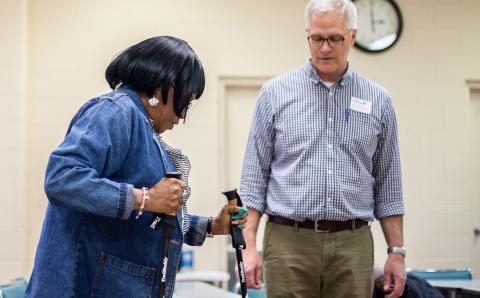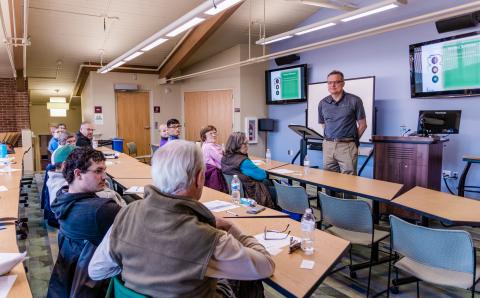Synod 2019 (the general assembly of the Christian Reformed Church) approved a far-reaching restructuring of its financial system, revising the relationship between the congregations and denominational ministries.
For more than 150 years, the denominational budget-setting process began with costs. The costs were met by asking congregations to provide money based on its number of members.
The new system adopted by synod begins not with costs but with pledges made by the congregations. The denominational budget will be based on the amount the congregations pledge to denominational ministries.
Churches Contributing Less
Over the years, some congregations have continued to dig deep but others haven’t or can’t. In answer to proposals to move away from the ministry share system, synods and denominational officials would point out the efficiency of this way to raise ministry money. The costs of raising ministry shares is negligible—about 20 cents for every $100. To raise the same amount money using professional fundraisers costs about $25—one dollar to raise three.
Even so, of late, the ministry share system has been showing signs of strain. The percentage of ministry shares collected by the denomination has fallen to about 60%. This means that every year as synod sets the amount of the next year’s ministry share—$346 currently—it does so realizing that in fact the churches collectively will pay 60% of this number. But this collective figure includes some churches that will pay the full $346 (some even more) and some churches, far less or none at all.
In 2016, Classis Iakota (a regional body of churches) brought a proposal to synod to radically restructure the ministry share system. The Iakota proposal would have eliminated ministry shares for the mission agencies. They would be supported entirely by money raised by other means. Ministry shares would be used only to support mission-critical denominational offices and ministries. The money raised by the ministry shares would be cut in half.
Synod 2016 received a much more moderate reform proposal from the then-Board of Trustees of the denomination (now the Council of Delegates). Synod did not adopt the Iakota proposal, but, prompted by it in part, they asked that the administration and the Council of Delegates “reimagine ministry shares.” The proposal that Synod 2019 adopted is the result of that request of Synod 2016.
The New Direction
The new direction adopted by Synod 2019 puts the right to decide the amount to be contributed to denominational ministries in the hands of the congregations. In the old system, synod declared a ministry share amount. Congregations were expected to fairly count their active members, multiply by the ministry share amount, and contribute that amount.
The new system begins with the congregations. They will each consider how much to contribute to denominational ministries. The denomination will supply the congregations with information to help them establish this amount, but the pledge will be established by the church council. Information about implementation will roll out this summer.
The councils will bring these pledges to the classes (regional gatherings of churches). The proposal hopes the classes will encourage churches with financial means to step up to a greater share of denominational ministry costs and help out congregations with less money.
The classes will send the amount of the pledges to the denomination, which will in turn create ministry budgets. The budgets will be approved by synod annually.
Synod built in a year for this system to get up and running. For the next year, councils and classes will be encouraged to discuss the new system. Final approval for proceeding with the new system will come from Synod 2020.
How Synod 2019 Got There
For a change of such great consequence in the life of the church, it nearly got derailed due to procedural confusion. In the end, synod backed up and started again.
Most of the voices were in favor of the proposal. Jonathan Owens, Classis Yellowstone, with expertise in both business and city government (Boseman) said it will make planning easier. Vern Swieringa, Classis Zeeland, said, “The process will foster a much deeper covenantal relationship with each other.”
John Tenyenhuis, Classis Toronto, highlighted the importance of the discussion. “Ministry shares are really crucial,” he said. “We need to throw some passion at it and talk it through.” Even so, he was willing to “go for it.”
But there was nervousness about it as well. Tom Wolthuis, Classis Central Plains, said the plan was very similar to one they had adopted in their classis. Overall, the plan worked but his campus ministry took a 15% reduction in the money they were receiving from the classis churches. Chelsey Harmon, Classis B.C.-Northwest, asked, “Is there a plan if this doesn’t go well?” Steve Bootsma, Classis Thornapple, wondered what would happen if the churches failed to pay their pledges. “Is there a hammer?” he asked. He was assured there was none.
John Bolt, the longtime denominational director of finance, said the denomination “is prepared to respond to whatever happens whether [the money that comes in] is less or more.” Asked whether he was concerned that contributions would fall under the new pledge system, he said he was not. He said “he believes that people will respond positively.”
Synod 2019 is meeting at Calvin College in Grand Rapids, Mich., from June 14-20. For continuous coverage from our award-winning news team, download the Banner app on your mobile device or follow The Banner Magazine on Facebook or @crcbanner on Twitter. You can find more tweeting by following hashtag #crcsynod. News stories will be posted on The Banner’s dedicated Synod web page several times daily. Unless noted otherwise, all photographs are by Karen Huttenga.
About the Author
Clayton Libolt was the long time pastor of River Terrace Church in East Lansing, Mich. Since his retirement, he has served in a variety of interim positions. He is presently serving as the interim senior pastor of Sonlight Community CRC in Lynden, Wash.









